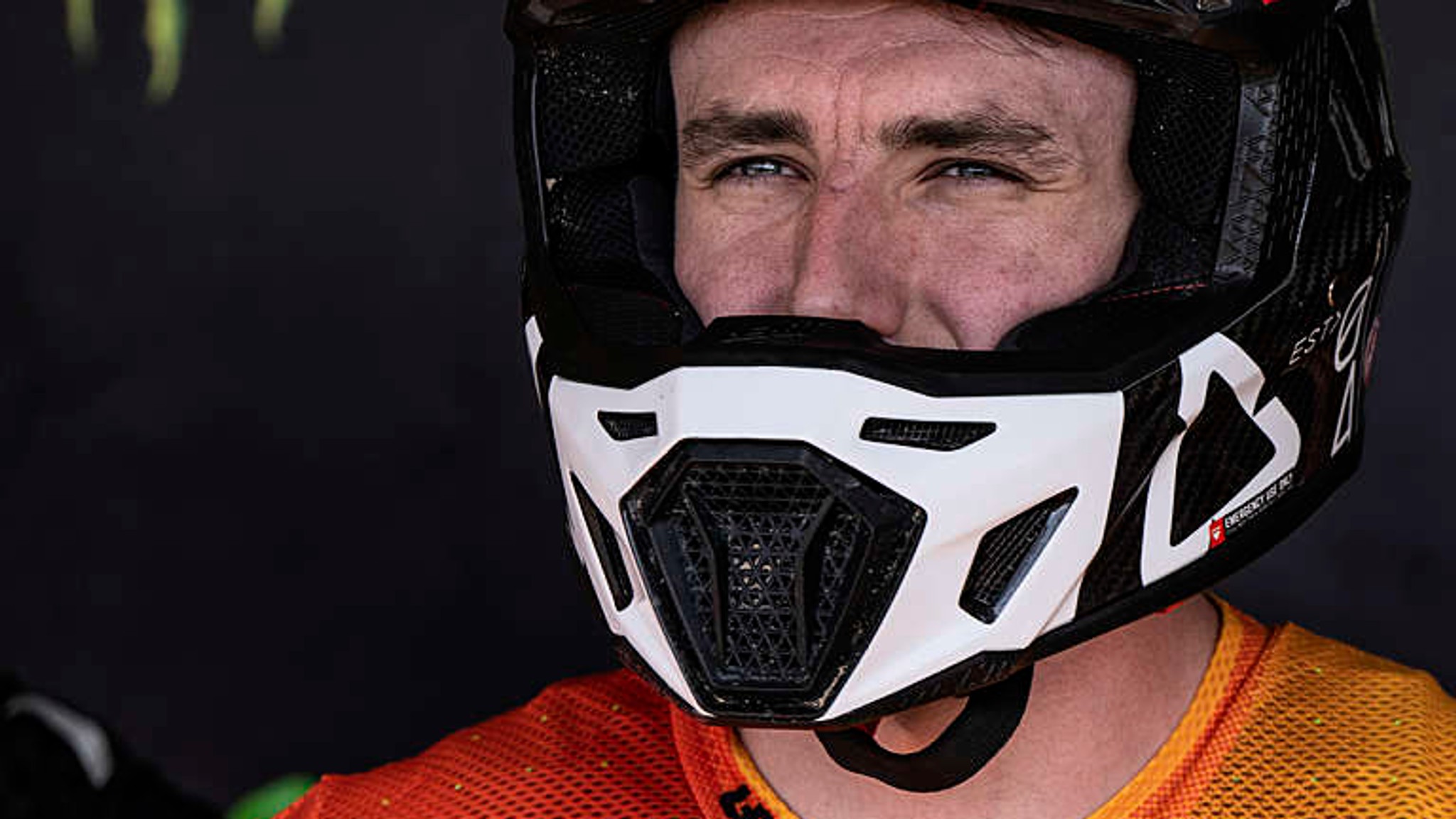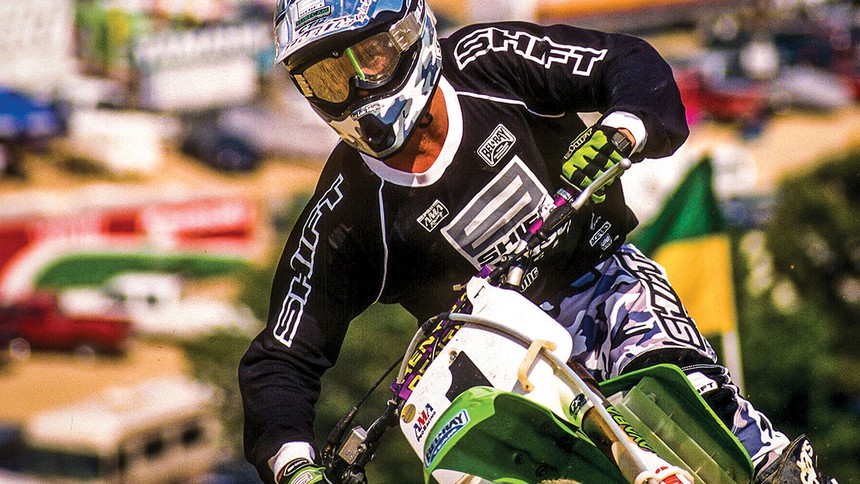Adam Sterry Interview - Leatt
Our guest on the Leatt interview from the Grand Prix of Trentino is British rider Adam Sterry, the 27-year-old rider who has been on the Grand Prix scene now for nearly a decade. Sterry has ridden for some very good teams in his career and currently races for the Schmicker KTM for 2024, with him doing all the European based GP rounds and also the ADAC Masters in Germany.
Leatt Support MXLarge and Adam Sterry: Leatt®: The Science of Thrill
The Brit actually won a moto last weekend at the ADAC and finished on the podium. We did a two-part interview as I know many people these days are not really into long interviews. So, here is a great talk with a very interesting and knowledgable motocross rider.
MXLarge: How did your ADAC experience go last weekend?
Sterry: I am very happy with my start here in Fürstlich Drehna. I felt comfortable on the bike and it was great to be able to ride in front of such a backdrop with so many fans. At the start of the second run, I noticed at the 5-second board that I was still idling, and a bit of stress arose for a moment. That wasn't intentional, but since I got a good start and won the race, maybe I should do it more often from now on.
MXLarge: We were on the same flight coming back from the GP in Trentino and it wasn’t a great experience, with the flight originally delayed for 30 minutes, then another three hours as we sat on the runway (due to bad weather in Amsterdam). I left my hotel at 8am and got home at 10pm, so, a long trip home. I can imagine you love doing the racing, but a lot of people don’t realize how painful the travel can be at times.
Sterry: I mean, people always ask me, what is difficult about the GPs or doing the domestic championship and a lot of people don’t realize how much the travel takes out of you. It is equally one of the hardest things, when doing the full World championship. That is my fourth plane to the GPs and fourth delay. Your weekend goes from just Saturday and Sunday, to actually Thursday evening until Monday evening. You need to wake up early. My Riola flight was at 3am, two flights back to Eindhoven, so also a long one. You then go again the next weekend. As you said, a two-hour flight, turns into a 14-hour day of travelling.
MXLarge: I am not a competitive person, I am not a hard worker, and I am not a risk taker, so I watch you guys, be it the guys up front, or you guys in the middle of the pack and I just don’t get it. It seems to me, a normal person, to be just ridiculously crazy. Why do you do it, when the risk is so high and the reward so low?
Sterry: I wonder that myself sometimes. It is something I have done since I was six and I love the sport. MXGP, it is difficult to get to that stage. You know, you go through your career, club level, youth level, then the whole European. Staying injury free, keeping a ride and getting to that level, its very difficult and obviously, you are fighting with the World best, because Europe is the pinnacle of the sport. Because it is such a challenge, that is what keeps people going back for it and you are fighting the World best. Motocross, unlike other sports, which are often one dimensional, in motocross you need everything. I am not sure there is another sport, where you need so many variables to be competitive.
MXLarge: To be honest, maybe we are too hard on the guys running around between 15th and 30th, because if you tell somebody off the street, you are in the top 20 in the World in your sport, which sounds pretty impressive. Sometimes people like me, the media or the fans forget that.
Sterry: Yes, in many other sports, if you are 20th in the World, you are praised or like the king, but in motocross, 20th isn’t looked like that. Even fourth place is sometimes not looked that great. If Febvre, Herlings, Gajser or Prado get fourth on a weekend, nobody is clapping or celebrating, which is strange really you get a 10th in F1 and you are the man. It is a weird one in motocross.
MXlarge: When we talk about the variables, like your body, staying fit, the machine, connection with the machine, a track that changes on every lap, then the next GP its another track, with completely different soil or design. What to you is the biggest variable, I mean mental strength has to be pretty high up there?
Sterry: I mean, to mention one, it is rather difficult. Obviously, what you said, you have to be mentally strong, to deal with all those variables you kind of touched on. Motocross is not an easy sport, and we risk our lives or serious injury, every time we race, and you need to be mentally strong, just to get past that part. Obviously physical condition is a massive part, but then again, loads of variables go into that. It isn’t just endurance we need, we need flexibility, strength, power, good cardio, adrenaline, you need to keep focused, balance, pretty much every aspect of fitness goes into racing motocross. Then you have to deal with the travelling, as you said, the track changes, every single lap. Like in Trentino, I came up short one time on the big triple behind pit lane and because you are going at that thing, full speed and I hit one small bump and I needed to make a split second decision, like less than point one of a second decision, if you are going to jump it or not. That is also, people don’t realize, because not everyone can ride a motocross bike at those speeds, a small stone can fall into a rut or the rut can blow out and at the speed we hit it, you have to make an instant decision, what are you going to do about that situation. If you make the wrong decision, it can make serious consequences. Then you have track prep, weather, small injuries, there is a lot that goes into it.
MXLarge: You have been a bit of a part-time GP rider in recent years, having not raced a lot at times the last few years. How difficult is that to come in and race at this level, because you have had years where you race maybe one or two rounds and you are racing against not only factory machines, but riders who have had a better preparation for the GP season?
Sterry: Very difficult and the sport has changed so much. The last few years, I have been doing the odd GP and when you do that, it is very hard, because you are not in the flow of it. You miss the intensity and the guys who ride there every single week, they ride with that intensity. You mentioned with the bikes, the factory bikes are top factory and with a privateer team, it is difficult also with getting parts and stuff. With the metal start grid, that also makes it harder, because when it was just dirt, you would sometimes still get a good start with technique on different types of ground, how you prepped your gate, but now with the grids, all the factory teams have electronics on the bike set-up for the metal gate and the bike does it for you. The smaller teams, we still do it manually.
Images by FullSpectrum and ADAC
Part two later in the week







